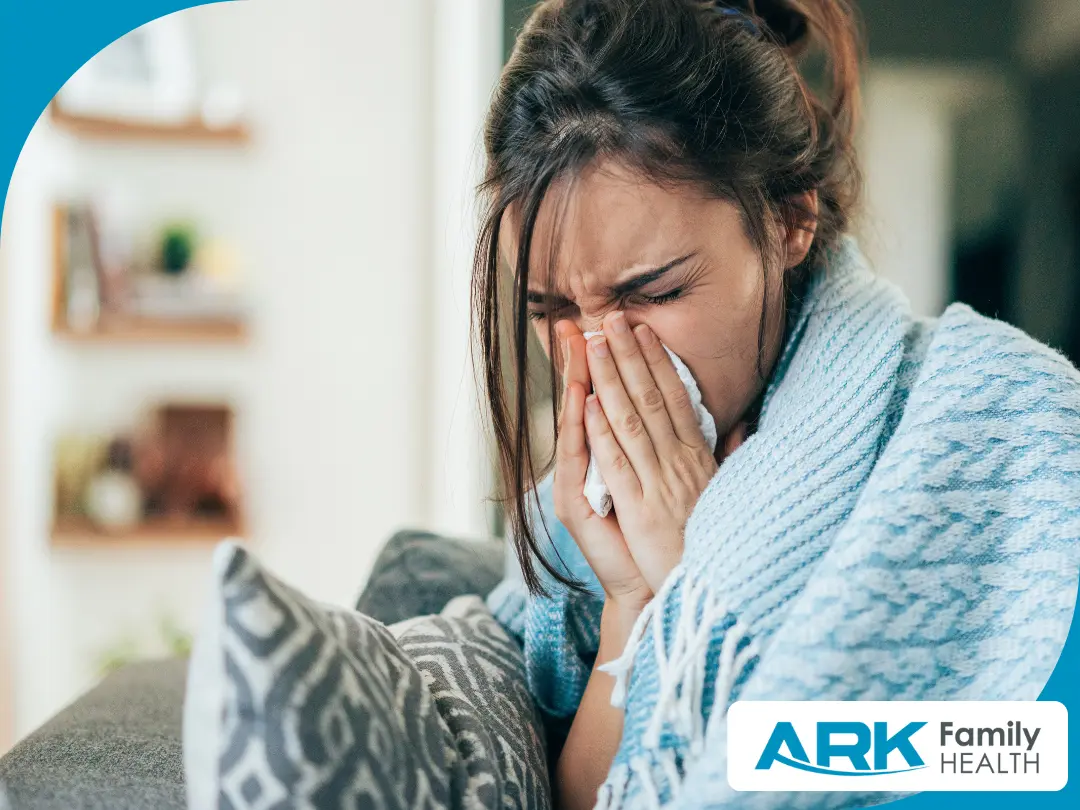Doctor’s Orders From Your Direct Primary Care Physician
Although it may not get below freezing in Phoenix, you will experience some very cold months. During these times, doctors often refer to the period as the dreaded cold and flu season. While you can’t completely avoid getting sick, there are several steps you can take to boost your immune system, minimize the impact of these illnesses, and stay as healthy as possible.
Here are some key recommendations.
The Key to Staying Healthy During Cold and Flu Season: Prevention!
The Best Offense is a Good Defense: Get Vaccinated
- Flu shots: The flu vaccine is highly effective in preventing serious flu illness, hospitalization, and even death. According to the Centers for Disease Control and Prevention (CDC), it’s recommended for everyone 6 months of age and older. For the elderly and immuno-compromised, vaccinations could be a lifesaver. Be sure to get your flu shot every year.
- COVID-19 vaccines and boosters: Staying up-to-date on COVID-19 vaccinations also provides significant protection against severe illness and long-term complications.
Be a Hygiene Hero
- Wash those hands! Frequent handwashing with soap and water for at least 20 seconds is crucial. If soap and water aren’t available, use hand sanitizer with at least 60% alcohol.
For Kids: Play a game where they imagine their hands are covered in wet paint. Have them visualize all the places they touch. Help them understand how germs can be spread by touching everyday objects.
- Cover your coughs and sneezes: Use a tissue to cover your mouth and nose when you cough or sneeze, then dispose of the tissue properly. If you don’t have a tissue, cough or sneeze into your elbow.
For Kids: Demonstrate the action clearly and explain why it’s important to prevent spreading germs. Use fun and engaging language like calling it a “superhero cough,” and practice with games or role-playing where they can practice coughing or sneezing into their elbow when prompted.
- Avoid touching your face: Your hands touch many surfaces throughout the day, which can harbor germs. Avoid touching your eyes, nose, and mouth.
Develop Healthy Habits
- Eat a balanced diet: You know what they say, “An apple a day keeps the doctor away.” Focus on fruits, vegetables, and whole grains to strengthen your immune system. Try to eat the rainbow. Try to incorporate two to three different-colored fruits or vegetables at every meal and at least one at every snack.
- Get enough sleep: Adults should aim for 7-9 hours of quality sleep per night – and children and babies need even more sleep. Refer to the Sleep Foundation’s sleep chart to see the recommended sleep time by age group.
Did you know, the National Sleep Foundation recommends stopping screen time at least 30 minutes before bed? Limiting screen time can also have other health benefits, including lowering stress, improving focus and brain function, boosting physical activity, improving posture, and reducing eye strain.
- Manage stress: Chronic stress can weaken the immune system. Practice stress-reducing techniques such as yoga, meditation, or deep breathing exercises.
- Stay hydrated: Drink plenty of fluids, especially water, throughout the day. The Arizona Department of Health Services recommends drinking 2.7 to 3.7 liters of water per day (approximately 8 cups). If you work outside, however, that amount increases substantially to 1 to 2 liters per hour.
So, You Still Got Sick During Cold and Flu Season – How Do You Get Healthy Fast or Keep From Getting Worse?
Listen to Your Body:
Rest is crucial when you’re sick. Stay home from work or school to avoid spreading your illness. Work will be fine for a few days, and your spouse can cover the parenting duties for a short time. Make yourself rest. Your body needs it now more than ever.
Use Over-the-Counter Remedies:
For mild cold and flu symptoms, over-the-counter medications like acetaminophen or ibuprofen can help reduce fever and relieve aches and pains. They are generally safe and well-tolerated. When you are very stuffy, an antihistamine or a decongestant can offer some relief. If you have concerns about what to take, please call your healthcare provider for guidance.
Stay Hydrated:
Drink plenty of fluids, such as clear broths, water, and herbal teas, to prevent dehydration. This is especially true if you are taking any antihistamines or nasal decongestants. These medications can cause dryness in your mouth, nose, and throat, essentially “drying you out” as a common side effect; this is because both types of drugs can reduce moisture production in your body’s mucous membranes.
Use Over-The-Counter Supplements:
According to the National Institutes of Health (NIH), Vitamin C, Zinc (taken orally), and Echinacea have been found to be at least somewhat helpful in reducing the length and severity of your cold symptoms. If you have concerns about what to take, consult your healthcare provider for guidance.
Consider a Visit to Your Primary Care Doctor:
If your symptoms are severe or not improving, it’s important to see your doctor. Sometimes the cold and flu can develop into more serious conditions and may require medical intervention to help you get healthy. Call your healthcare provider if symptoms persist. They are here to help, and they are only a phone call away!
How Your Direct Primary Care Physician Can Help You Stay Healthy During Cold and Flu Season and Throughout the Year
Your Direct Primary Care Physician is there to support you and your family. In fact, it is their job to help you, and your family stay healthy – all throughout the year.
A Direct Primary Care Physician can:
- Provide personalized advice: Based on your individual health history and risk factors, a Direct Primary Care Physician can offer tailored recommendations for preventing and managing colds and flu.
- Administer vaccinations: A Direct Primary Care Physician can conveniently administer flu shots in their office.
- Diagnose and treat infections: If you do get sick, a Direct Primary Care Physician can quickly diagnose your illness and recommend the most appropriate treatment plan.
- Offer ongoing support: A Direct Primary Care Physician can provide ongoing support and guidance to help you maintain your health and well-being.
Remember:
Prevention is always the best approach. But if you do get sick, remember that you don’t have to face it alone. Your Direct Primary Care Physician is here to partner with you in your health journey.
But perhaps the more important thing to remember is to take the time to care for yourself. Whether that means hydration, sleep, or what you eat, it is always recommended that you take the time for a little self-care – doctor’s orders.





